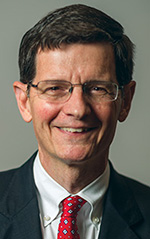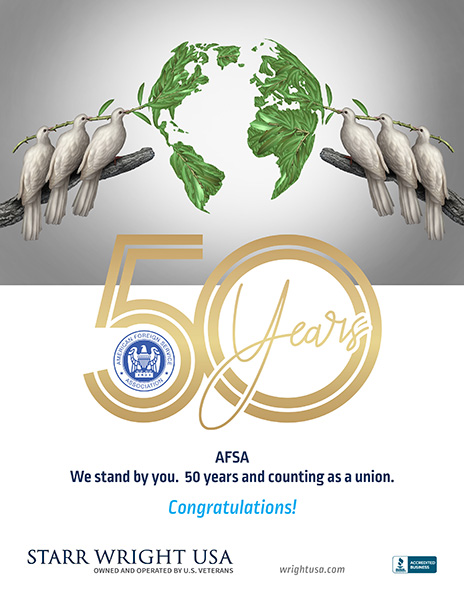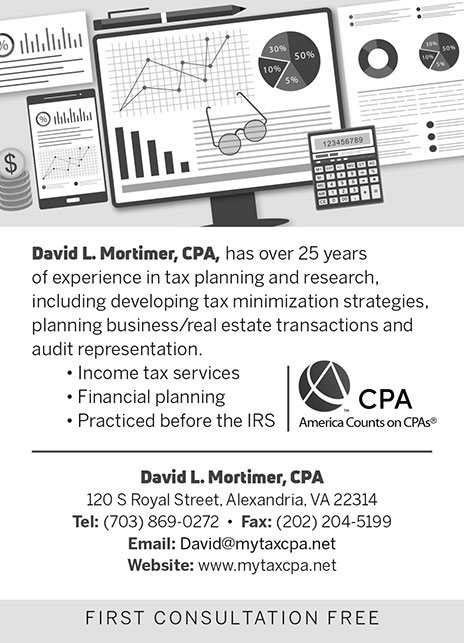AFSA Becomes a Union: Why It Matters
In becoming a union, AFSA gained new powers to influence the personnel system and safeguard the interests of career diplomats.
BY JOHN K. NALAND
Half a century ago, a few dozen Foreign Service officers led the effort to combine AFSA’s mission as a genteel professional association with the authority of a union empowered to negotiate with foreign affairs agencies for the interests of its members. The importance of becoming a union may not be obvious to current members of the Foreign Service. This article seeks to explain why it matters.
No Rights, No Recourse
In 1969 State Department FSO Charles William Thomas was separated from the Foreign Service after being passed over for promotion. Only 47 years old, with just 18 years of service, he did not qualify for a pension. After nearly two years of unsuccessful job searching, he committed suicide in despair, leaving a widow and young daughter.
Problems were belatedly discovered with his file that the promotion boards reviewed. A laudatory evaluation report from the Office of Inspector General had been misfiled in another officer’s file. Mr. Thomas had not been allowed to see and rebut the single negative evaluation report in his file. Instead of encouraging boards to carefully consider employees in their final year of promotion eligibility, the promotion precepts cautioned against promoting such individuals.
This all happened because employees in those days had few rights. The personnel system was run by an old boy network of senior officers who managed the Foreign Service as they saw fit. Decisions on promotions and selection-out were not reviewable, either within the agency or by an independent third party. Employees were not allowed to see all the comments nor could they seek removal of falsely prejudicial remarks. Promotion and assignment rules were set without input from employee advocates.
The Thomas tragedy was just the highest-profile example of an unaccountable personnel system. Because it coincided with AFSA’s rise to becoming a union, AFSA was able to step in to press for reforms. As an independent employee advocate, AFSA went directly to Congress to seek legislation creating a Foreign Service grievance system (established in 1976) to provide due process to employees deprived of a right or benefit authorized by law or regulation. As an energetic employee advocate, AFSA convinced the State Department to adopt the “annuity exception” allowing FS-2s and below, like Mr. Thomas, to remain on active duty to age 50 to qualify for a pension (that rule remains in effect a half century later).
AFSA’s Powers
In becoming a union, AFSA did not cease being the professional association of the Foreign Service; but it gained new powers to influence the personnel system and safeguard the interests of career diplomats as they work to promote U.S. security, prosperity, and democratic values.
As a union, AFSA has the right to negotiate with agency management over personnel policies and procedures affecting conditions of employment. Once a collective bargaining agreement is reached, an agency cannot ignore it. If agencies try to do that, the agreement is legally enforceable by AFSA appealing to third-party adjudicatory bodies such as the Foreign Service Grievance Board. AFSA can also file cohort grievances on behalf of specific groups of employees—for example, compelling the State Department to pay Meritorious Step Increases as AFSA did in the mid-2010s. AFSA can even force agencies to follow rules adopted in permissive negotiations outside of required collective bargaining—for example, securing a ruling that the State Department violated a negotiated agreement when it assigned a Civil Service employee as a deputy chief of mission over 12 Foreign Service bidders in 1999.
Significantly, the Foreign Service Act of 1980 gives AFSA a formal role in selecting the members of two of the third-party adjudicatory bodies to which AFSA may appeal: the Foreign Service Grievance Board (which rules on individual and cohort grievances and implementation disputes alleging breach of a collective bargaining agreement) and the Foreign Service Labor Relations Board (which rules on unfair labor practices, negotiability issues, and appeals of implementation disputes from the Grievance Board). In addition, AFSA has long been consulted on selecting members of the Foreign Service Impasse Disputes Panel (which rules on negotiating impasses arising during collective bargaining).
The personnel system was run by an old boy network of senior officers who managed the Foreign Service as they saw fit.
As union officials, the AFSA president and agency vice presidents have the right to speak independently to Congress without getting agency approval or violating the Anti-Lobbying Act. For example, as AFSA president in 2008, I testified before a Senate appropriations subcommittee about the need to increase Foreign Service hiring to refill positions transferred to Iraq from posts worldwide. Also testifying was the principal deputy assistant secretary of State for human resources. Before the session, when I asked her if she planned to request more staffing, she replied: “No, I must articulate administration policy, which is not asking for increases.” But empowered by my independence as a union official, I did forcefully articulate that need in my testimony. A few months later, Congress approved funding for a major staffing increase.
The freedom to directly lobby Congress is one of AFSA’s critical strengths as a union. The list of legislation over the past 50 years for which AFSA was the leading proponent or played an important advocacy role is a long one. It includes: creating the Foreign Service grievance system, exempting Foreign Service members from capital gains taxation on the sale of their primary residence after overseas service of up to 10 years, establishing Overseas Comparability Pay, helping to convince Congress not to move the visa function to the Department of Homeland Security after the 9/11 terrorist attacks, building a bipartisan coalition on Capitol Hill to block massive budget cuts to diplomacy and development during the Trump presidency, and gaining parity with the military for the Foreign Service on a range of benefits including in-state college tuition rates.
AFSA leaders may also speak independently to the media. For example, after Secretary of State Rex Tillerson decapitated the Senior Foreign Service in 2017 by slashing promotions and telling some of our most senior FSOs to clear out their desks, he gave the media erroneous statistics that understated the cuts. But AFSA obtained authoritative details on how many career ambassadors and other senior officers had been purged, and AFSA President Barbara Stephenson gave that information to the media, which reported the true numbers showing the damage. Her President’s Views column in the December 2017 Foreign Service Journal, “Time to Ask Why,” laid out the details and was quoted by most major media outlets. As soon as Tillerson was fired in 2018, promotions and hirings increased.
As a union, AFSA has assisted tens of thousands of members over the decades with grievances, investigations, discipline proposals, security clearance suspensions, and Equal Employment Opportunity complaints, as well as assignment, leave, medical, and other issues. AFSA has represented hundreds of members in Diplomatic Security, Office of Inspector General, and FBI interviews, and before Accountability Review Boards and congressional committees. AFSA’s status as a union allowed it to pay more than $485,000 in legal bills for Foreign Service members subpoenaed to testify in the Trump impeachment hearings so they would not suffer personal financial ruin. While ethics rules usually prohibit federal employees from accepting gifts, including free services, as a union AFSA is allowed to arrange for outside attorneys to represent its members. In effect, those private attorneys are providing services to AFSA, not to the employee. Thus, AFSA’s payment of those legal bills is a benefit of AFSA membership, not a prohibited gift to the employee.
Not a Typical Union
Like other unions, AFSA works to address the concerns of individual members. But because AFSA is also a professional association, it sometimes puts greater priority on the long-term institutional well-being of the career Foreign Service. This focus on long-term issues contrasts with management officials at the State Department and other foreign affairs agencies, who sometimes seek to address short-term problems without considering longer-term implications for the Foreign Service career.
For example, when Secretary of State Colin Powell decided to require leadership and management training after each mid-level Foreign Service promotion, the Bureau of Personnel wanted to phase in the requirement over a decade. AFSA objected, urging a more rapid implementation to compel training-resistant members to comply for the good of the Service.
In that same era, citing large staffing gaps in mid-level positions, the Director General’s office asked AFSA to agree to administratively promote all FS-4s instead of having them individually compete for promotion. AFSA refused, saying that even if the selection board promoted almost all of them, it could still hold back those not ready for greater responsibilities—that is, those whose promotion would be a disservice to them and to colleagues whom they would then supervise.
AFSA’s status as a union allowed it to pay more than $485,000 in legal bills for Foreign Service members subpoenaed to testify in the Trump impeachment hearings.
A significant difference between AFSA and Civil Service unions is that those unions do not represent supervisors. But thanks to the unique employee-management system negotiated by Ambassador (ret.) Tom Boyatt and others in the early 1970s, AFSA represents the entire Foreign Service worldwide, including supervisors and every cone, backstop, specialty, and rank with limited exceptions such as colleagues in ambassadorial and assistant secretary positions. In addition, many of the senior leaders whom AFSA does not legally represent are nevertheless AFSA members in its capacity as a professional association. Combined with the fact that more than 80 percent of Foreign Service members voluntarily pay AFSA dues (Civil Service unions average 30 percent), it means that AFSA truly is the “voice of the Foreign Service”—and thus carries added authority and influence with agency management, Congress, and the media.
Another difference between AFSA and Civil Service unions is that a higher percentage of retirees retain their membership after leaving active duty. Retiree dues not only fund advocacy on their behalf, but also advocacy for active-duty members still in harm’s way. In addition, retirees are major contributors to the AFSA Political Action Committee and Legal Defense Fund. A dozen retirees who are former AFSA presidents meet from time to time with the current president to share their experiences and insights.
Other AFSA Strengths
As AFSA marks the semicentennial of becoming a union, it is useful to catalogue its other strengths. These strengths may prove critical in the future if political leaders again seek to cripple federal unions and deprofessionalize the career federal services.
AFSA has a strong professional staff. With just six employees when AFSA first became a union, it soon thereafter hired its first staff attorney followed by its first congressional lobbyist. Today, the staff totals 39, including seven attorneys. Eight have been with AFSA for more than 20 years, applying their deep experience to advancing member interests.
AFSA’s Foreign Service Journal has been a forum for news, history, discussion, and debate about issues related to diplomacy and the Foreign Service since 1924. It presents diplomatic history through the lens of the practitioner with open access online for those inside and outside the Foreign Service. The Journal added its AFSA News section in 1968, providing a unique space for AFSA to track and share union activities and concerns.
Financial strength is another important asset. Over the past two decades, AFSA steadily amassed a “rainy day” reserve fund that now exceeds $3 million. Those resources are available to be drawn on if needed to wage legal or media battles to protect career diplomacy. The hundreds of thousands of dollars in donations to AFSA’s Legal Defense Fund to pay attorney bills of impeachment witnesses show that additional funds can be raised in times of peril.
Finally, AFSA’s 21-member Governing Board is another strength. Its members are popularly elected by the entire Foreign Service. The board includes representatives of all six foreign affairs agencies. Boards typically include FSOs and FS specialists, a variety of cones and grade levels, and retirees, as well as having gender and racial diversity. That diversity, of course, depends on who runs for office and whom the voters elect. So, each election cycle, AFSA members have the ability and opportunity to increase that variety of backgrounds and perspectives.
The Next 50 Years
Asked in 1787 what kind of government the Constitutional Convention had adopted, Benjamin Franklin replied, “A republic if you can keep it.” That same note of caution applies to AFSA as a union. Current and future AFSA Governing Boards must not shy away from utilizing the union rights their predecessors won for them. And they must vigorously defend those rights should they be threatened.
When sharing or linking to FSJ articles online, which we welcome and encourage, please be sure to cite the magazine (The Foreign Service Journal) and the month and year of publication. Please check the permissions page for further details.
AFSA Legislative Victories
Legislation for which AFSA was the leading proponent or played a critical advocacy role.
1975 After years of effort, legislation passes creating the Foreign Service grievance system.
1980 AFSA contributes to the drafting of the Foreign Service Act of 1980.
1998 The first of two decades of increased annual funding to upgrade embassy security is secured following the terrorist attacks on U.S. embassies in Kenya and Tanzania.
1999 Legislation mandating Law Enforcement Availability Pay (LEAP) for Diplomatic Security Special Agents is enacted.
2001 Increased funding for hiring is secured under Secretary of State Colin Powell after years of AFSA documenting the need in congressional testimony and public statements.
2002 Legislation is passed authorizing retirement credit to eligible family members who performed part-time, intermittent, temporary (PIT) service abroad between 1989 and 1998.
2003 Virtual locality pay is established so that Foreign Service members serving overseas prior to retirement have their pensions calculated based on the Washington, D.C., locality pay rate.
2003 Legislation exempting Foreign Service members from capital gains taxation on the sale of their primary residence after overseas service of up to 10 years is enacted.
2009 Overseas comparability pay is established, which currently boosts the salaries of overseas Foreign Service members by 21 percent (two-thirds of D.C. locality pay).
2009 A proposal to eliminate all funding for the Foreign Commercial Service is stopped.
2017 The beginning of four years of successful efforts to build a bipartisan coalition on Capitol Hill that rejected massive budget cuts to diplomacy and development sought by President Donald Trump.
2021 Legislation is adopted giving the Foreign Service parity with the uniformed military on benefits including in-state college tuition for students in their state of domicile and the ability to break certain leases/contracts without financial penalties.
2021 Legislation is signed into law providing employees additional financial support for brain injuries from anomalous health incidents (AHIs).
2021 Legislation is blocked that would have authorized a large mid-level entry program for the Foreign Service at the State Department.
AFSA Labor Management Achievements
• Assisted tens of thousands of members over the decades with grievances, investigations, discipline proposals, security clearance suspensions, and Equal Employment Opportunity complaints, as well as assignment, leave, medical, and other issues.
• Blocked repeated State Department attempts over many years to assign Civil Service (CS) employees to career-enhancing Foreign Service (FS) positions overseas, ignoring the Foreign Service Act of 1980 requirement that FS jobs normally be filled by FS employees. For example, secured a ruling that the department violated a negotiated collective bargaining agreement by assigning a CS employee as a deputy chief of mission. Secured limits on the department’s CS excursion program after it violated an agreement with AFSA by assigning CS employee to an Iran watcher position in London.
• Won or settled multiple cohort grievances over the decades on behalf of groups of FS members. For example, AFSA won a dispute over the way the Foreign Agricultural Service assigned two CS employees to overseas positions, persuaded the Foreign Commercial Service to permit employees to attend the Foreign Service Institute Job Search/Transition Program, settled a dispute with USAID over Foreign Service Limited employee assignments, secured payment of locality pay to employees attending training, won retroactive Meritorious Step Increases for more than 1,000 State Department employees, won a dispute regarding eligibility for Senior Foreign Service performance pay, and won deserved overtime pay for 49 Diplomatic Security (DS) agents.
• Worked during the 1990s to end discrimination in FS agencies based on sexual orientation by providing legal support to lesbian and gay members who were being targeted by DS, and worked with the employee group glifaa to expand benefits for same-sex partners.
• Filed amicus curia briefs in court successfully arguing that the Secretary of State may not reverse a Foreign Service Grievance Board decision overturning an employee’s separation for cause and, in a separate case, that a consul general was acting within the scope of his employment when he was involved in a car accident overseas and thus may not be sued in civil court in the United States.
• Blocked State Department attempts over many years to amend the Foreign Service Act of 1980 to put employees with suspended security clearances in a leave-without-pay status, which could potentially last for years due to the slow process of restoring security clearances.
• Convinced the State Department not to repeal the annuity exception that allows FS-2s and below who TIC (time-in-class) out before becoming eligible for an immediate annuity to continue working until they are eligible.
• Assisted a dozen members in being found “not liable” after they were charged with security violations when the State Department retroactively classified emails sent from then–Secretary of State Hillary Clinton’s private server.
• Represented hundreds of members in FBI and DS interviews and before subcommittees of Congress (including those investigating issuance of visas to 9/11 hijackers and the first Trump impeachment) and Accountability Review Boards (including for Cuba Anomalous Health Incidents, Benghazi, and the Nasar Square incident in Iraq).
• Pressed the State Department to create a process for employees to appeal assignment restrictions, and later secured legislation requiring the State Department to create an independent panel (outside DS) to decide assignment restriction appeal cases.
• Helped secure family-friendly reforms to the Special Needs Educational Allowance program.
• Negotiated procedural protections following the State Department’s decision to allow DS to record subject and witness interviews without the requirement to get the consent of the employees.
• Convinced the State Department during the pandemic to offer administrative leave for COVID-related purposes and to bring on new hires remotely instead of freezing all FS hiring.
Milestones as a Union
1967 AFSA membership elects “Young Turks” led by Lannon Walker and Charlie Bray who begin the transformation of AFSA from a staid professional association to an advocacy organization.
1968 AFSA establishes awards for constructive dissent.
1969 Following President Richard Nixon’s Executive Order 11491 allowing federal employees to unionize, AFSA leaders begin debating whether to seek recognition as the Foreign Service union.
1971 AFSA membership votes to seek recognition as a union. Tex Harris leads negotiations with State management on what becomes Executive Order 11636, setting labor-management rules for the Foreign Service.
1972 Bill Harrop and Tom Boyatt lead AFSA, competing with the American Federation of Government Employees (AFGE), to be selected by employees as the Foreign Service union.
1973 AFSA wins Foreign Service union-representation elections at the State Department, United States Information Agency (USIA), and USAID. (USIA included the Broadcasting Board of Governors [BBG], renamed U.S. Agency for Global Media [USAGM] in 2018.)
1975 AFSA hires first staff attorney.
1976 AFSA and State Department management reach agreement on regulations to implement grievance legislation enacted by Congress after years of debate.
1976 USIA Foreign Service members vote to leave AFSA to be represented by AFGE.
1982 AFSA hires first congressional lobbyist.
1983 AFSA establishes Legislative Action Fund.
1992 USIA Foreign Service members vote to leave AFGE to be represented again by AFSA.
1994 AFSA wins uncontested representation elections in the Foreign Agricultural Service and the Foreign Commercial Service.
1996 Publication of the first edition of AFSA’s Inside a U.S. Embassy book.
1996 AFSA members joined by AFGE demonstrate in front of Main State, protesting the nearly monthlong federal government shutdown and employee furlough.
1999 After the merger of USIA and State, AFSA negotiates the incorporation of USIA’s best practices into State’s personnel system.
2000 Constructive dissent awards are expanded to include Foreign Service specialists.
2002 AFSA Political Action Committee is formed.
2006 AFSA creates a Legal Defense Fund, renamed the Richard C. Scissors LDF in 2007.
2013 AFSA wins uncontested representation election for Foreign Service employees of the Animal and Plant Health Inspection Service (APHIS) at the U.S. Department of Agriculture.
2017 The complete digital archive of The Foreign Service Journal (1919 through present) is made available online.
2019 Legal Defense Fund pays more than $485,000 in legal expenses of AFSA members called to testify in the first Trump impeachment.
Read More...
- “From Striped-Pants Set to White-Collar Union” by Nancy Johnson, The Foreign Service Journal, May 1999
- “AFSA Becomes a Union: The Reformers’ Victory” by Tex Harris, The Foreign Service Journal, June 2003
- “AFSA Becomes a Union: Bread and Butter Issues” by Hank Cohen, The Foreign Service Journal, June 2003






